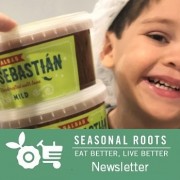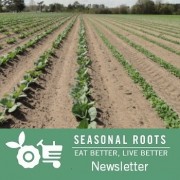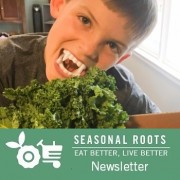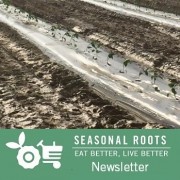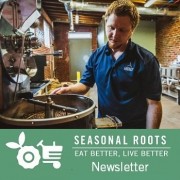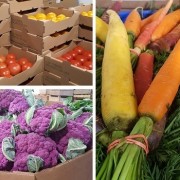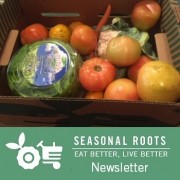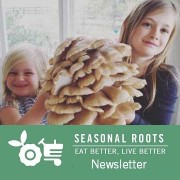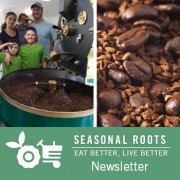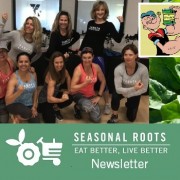And can you even trust those organic labels?
– By the Veggie Fairy Team:
So you want to eat food that’s good for you. But it’s hard to tell what’s truly good just by looking — you can’t see pesticides or lost nutrients.
When you’ve got nothing else to go on, that organic label seems like an easy solution. Organic foods have a reputation for being more nutritious and safer than non-organic. Plus, organic costs more, sometimes twice as much as conventional. If it’s more expensive, it must be better, right?
The truth, it turns out, is complicated.
Organic toxins — yep, that’s a thing
Think that organic label means something hasn’t been sprayed? Think again. A Bloomberg News reporter wrote a good article that explains the history of how and why organic labeling got started. She also gets into the uncertain science on whether or not organic actually more nutritious.
Some of the uncertainty is based on who’s doing the farming. In the beginning, organic labeling was driven by family farmers who relied on old school, eco-friendly organic practices instead of spraying chemical fertilizers and pesticides. But because there were no rules on what was officially “organic”, lots of farmers who did spray were claiming to be organic when they really weren’t.
But as the labeling movement gained steam and the government began writing regulations about what could be called organic, big agriculture corporations saw an opportunity and got involved. Needless to say, many of the resulting regulations benefit Big Ag, not small, truly organic family farmers.
So today, you can grow, say, lettuce that’s USDA certified organic that nevertheless tests positive for toxic substances. USDA guidelines allow certified organic farms to spray their crops with certain chemicals under certain conditions. According to this NPR story about organic pesticides, some of them probably aren’t harmful to humans. But some probably are.
Fake organic labels — yep, that’s a thing, too
Labels are only as good as the USDA’s ability to oversee the production of organic food and enforce the rules. Turns out, the department’s ability to do that is limited. There just aren’t enough inspectors to keep tabs on all the farmers and corporations here in the U.S., much less overseas.
Last year, a Washington Post investigative series revealed just how much of a problem organic food fraud is — bad enough that now Congress is working on legislation to double USDA’s oversight.
Organic or not, freshness counts
The sooner produce gets to you the better. Research shows that most nutrients begin to degrade from the moment produce is harvested. Spinach, for example, loses up to 60% of its nutrients in a week, the typical age of most grocery store produce. Our local produce gets to you within just a couple days of harvest.
Also, many studies have found that fruit that’s picked closer to the peak of ripeness (rather than being picked green and ripening on the shelf or by being gassed) contains more nutrients, more vitamins and minerals, than fruit that’s picked before or after peak, whether it’s organic or not.
This is why we hustle to get your produce to you as soon as possible after harvesting, and why being local helps — it doesn’t have to travel very far. Much of the food in grocery stores has traveled thousands of miles and many days to get there, losing nutrients every hour of the way.
Some of our local farmers are certified organic, and some use organic practices but just can’t make the financial investment that’s required to get certified. All of our local farmers are low- or no-spray. Many of them are multi-generational, so they care for their land, crops, and animals with the next generation in mind. The vast majority of our farmers don’t spray because that would jeopardize the integrity of their land. If they do spray, it’s minimal and only as required.
They also use sustainable practices like rotating their crops to avoid sucking all the nutrients out of the soil. That’s why we call sustainable farming “old school organic” — the way it was often done before the government got in the business of regulating it.
One of our sustainable farmers has a friend who runs a certified organic farm not far from him. One year, our sustainable farmer sprayed his yellow squash one time all season because it was necessary. His certified organic friend, on the other hand, sprayed his squash on a weekly schedule using a spray approved by the USDA. Our farmer isn’t considered certified organic, but his weekly spraying friend is allowed to use that title.
So how can you tell what’s good for you?!
Organic can be great! But only if you go beyond the regulations that were developed for Big Ag. There’s no official label that will tell you if something is only a couple days out of the field and truly fresh. There’s no label that will tell if it was grown by a farmer who’s sustainable or old school organic, using traditional methods with future generations in mind. The only way to know if something is really good for you is to know and trust your farmer.
That’s not possible for most of us as individuals. But when we come together as a group like Seasonal Roots, that’s exactly what we do. We know our farmers. We talk with them, visit their farms, and develop relationships with them. We share their stories with you so you can know them too, even if you don’t have time to go visit them yourself.
It’s not quite as easy as reading a label, but it’s a lot easier than trying to do the due diligence all by yourself!
ABOUT SEASONAL ROOTS
Since 2011, Seasonal Roots’ online farmers market has connected Virginia families with local family farmers who use sustainable, humane practices. Our veggie fairies – mostly moms who believe in living better through scrumptious, healthy eating, being kind to animals, protecting the environment, and spreading joy – home-deliver freshly harvested produce, eggs, grass-fed dairy and meat, plus artisan fare. We empower our members to eat better and live better with more nutritious, flavorful food that’s good for us and good for the planet. More info at seasonalroots.com.
